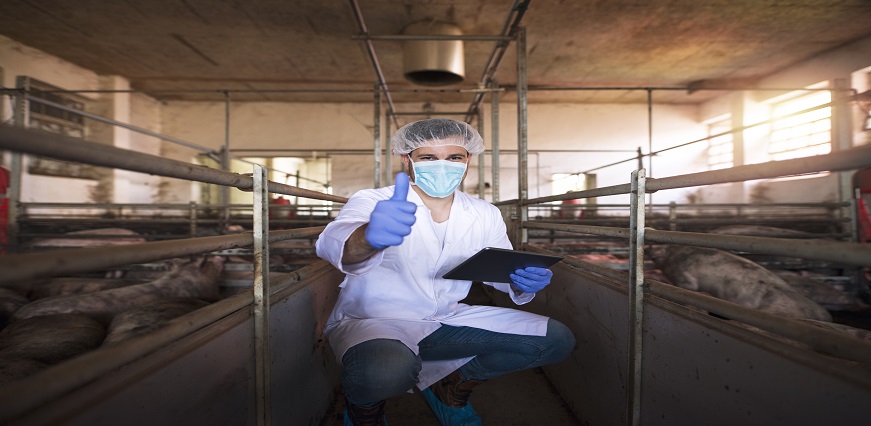





No lab centers are available in this city

Swine flu, also known as H1N1 virus, caused a worldwide pandemic in 2009. Even though the outbreak is no longer considered a pandemic by the World Health Organization (WHO), it remains a threat to public health. Swine flu symptoms may range from mild to severe and can lead to hospitalization or even death in extreme cases. It's essential to know what swine flu symptoms are and how to prevent them since it can be highly contagious. In this blog post, we will discuss everything you need to know about swine flu symptoms, treatment options, prevention methods, risk factors associated with the virus and when you should see your doctor if you suspect that you have been infected.
Swine flu is a respiratory illness caused by H1N1 virus, which was first detected in pigs. Like other flu viruses, swine flu spreads from person to person through droplets produced when an infected individual coughs or sneezes. The virus can also be contracted by touching surfaces contaminated with the virus and then touching your mouth or nose.
Swine flu, also known as H1N1 influenza virus, is a respiratory illness caused by the virus of the same name. The symptoms of swine flu are very similar to those of regular seasonal flu. However, it can be more severe and may lead to serious complications such as pneumonia.
Treatment for swine flu typically involves antiviral medications, such as oseltamivir (Tamiflu) or zanamivir (Relenza). These drugs work by stopping the virus from replicating in your body and can shorten the duration of symptoms. It's important to start taking these medications within 48 hours of symptom onset.
If you have severe symptoms or are at high risk for complications, hospitalization may be necessary. In some cases, oxygen therapy or mechanical ventilation may be needed if you have trouble breathing.
The best way to prevent the spread of swine flu is through prevention methods. Here are some tips for reducing your risk of getting infected with this virus.
Swine flu is a highly contagious respiratory illness caused by the H1N1 virus. While anyone can contract swine flu, certain groups of people are at higher risk for developing severe symptoms or complications.
Pregnant women are one such group. Changes in their immune system, heart and lungs make them more susceptible to serious complications from swine flu such as pneumonia and premature labor. People with chronic medical conditions like asthma, diabetes, heart disease or weakened immune systems due to HIV/AIDS or cancer treatments are also at greater risk of developing severe symptoms.
Young children under 5 years old and older adults over 65 years old have weaker immune systems that make them more vulnerable to the infection. Healthcare workers who come into direct contact with infected patients may be exposed to a higher level of the virus than other people.
If you think you may have symptoms of swine flu, it is important to monitor your health closely. While many cases of swine flu are mild and can be treated at home, some cases can become severe and require medical attention.
One of the most important things to look out for is difficulty breathing or shortness of breath. This could indicate that the virus has progressed to pneumonia, which requires immediate medical treatment.
Other warning signs include persistent vomiting, chest pain or pressure, dizziness or confusion, seizures, and a high fever that does not respond to medication. These symptoms may indicate more serious complications from the virus and should be evaluated by a healthcare provider as soon as possible.
As we have discussed in this article, swine flu is a highly contagious respiratory illness caused by the influenza virus that affects pigs. However, it can also be transmitted to humans and cause severe health complications.
The symptoms of swine flu are similar to those of seasonal flu, including fever, coughing, sore throat, body aches, and fatigue. If you suspect that you are infected with swine flu or experience any of these symptoms for an extended period of time, seek medical attention as soon as possible.
 Allergy Test
Allergy Test
 Anemia Test
Anemia Test
 Auto immune
Auto immune
 Blood disorder
Blood disorder
 Bone and Joint
Bone and Joint
 Cancer Test
Cancer Test
 Cardiology Test
Cardiology Test
 Covid Recovery
Covid Recovery
 Dengue Test
Dengue Test
 Depression
Depression
 Diabetes Test
Diabetes Test
 Fatigue
Fatigue
 Fever Test
Fever Test
 Full body
Full body
 Gastro Test
Gastro Test
 Gastrointestinal
Gastrointestinal
 Gynaecology Test
Gynaecology Test
 Heart Test
Heart Test
 HIV Test
HIV Test
 Hormone Test
Hormone Test
 Hypertension
Hypertension
 Immunity Test
Immunity Test
 Infectious Disease
Infectious Disease
 Infertility Test
Infertility Test
 Influenza Test
Influenza Test
 Iron Test
Iron Test
 Kidney Test
Kidney Test
 Liver Test
Liver Test
 Lung Test
Lung Test
 Nephrology
Nephrology
 Obesity
Obesity
 Orthopedics Test
Orthopedics Test
 Physician
Physician
 Pollution Health Checkup
Pollution Health Checkup
 Pregnancy Test
Pregnancy Test
 Prostate Test
Prostate Test
 Senior Citizen Test
Senior Citizen Test
 STD Test
STD Test
 Thyroid Test
Thyroid Test
 Tuberculosis Test
Tuberculosis Test
 Vitamin Test
Vitamin Test
 Women Health Test
Women Health Test
Sign up takes less than 60 secs and gives you access to your offers, orders and lab tests.
Looks like you are not registered with us. Please Sign up to proceed
OTP will be sent to this number by SMS
We have successfully received your details. One of the agents will call you back soon.
 To reach our help desk call 9213188888
To reach our help desk call 9213188888
No Lab Centers are available in this city
Looks like you are not registered with us. Please Sign up to proceed
OTP will be sent to this number by SMS
Not Registered Yet? Signup now.Looks like you are not registered with us. Please Sign up to proceed





 7982100200
7982100200.png)